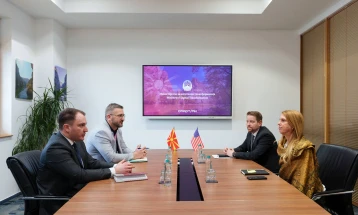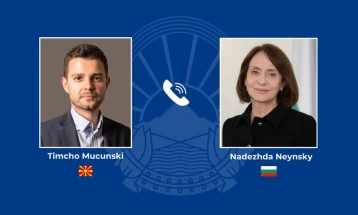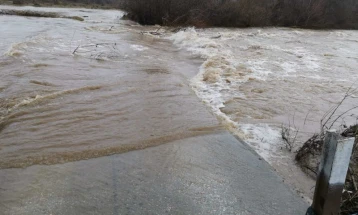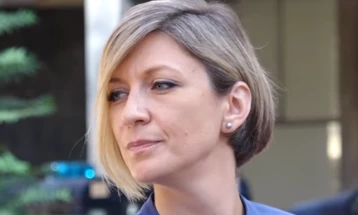Joint statement by Pirc Musar, Golob and Fajon on 20th anniversary of Thessaloniki Summit: Courageous political decisions are needed
- Slovenia's President Nataša Pirc Musar, Prime Minister Robert Golob, and the Minister of Foreign and European Affairs Tanja Fajon, point out in a joint statement on the 20th anniversary of the EU-Western Balkans Summit in Thessalonik that "the Summit conclusions remain an abiding commitment for us all – the EU with its member states, including Slovenia, and the Western Balkans".
- Post By Nevenka Nikolik
- 10:17, 21 June, 2023
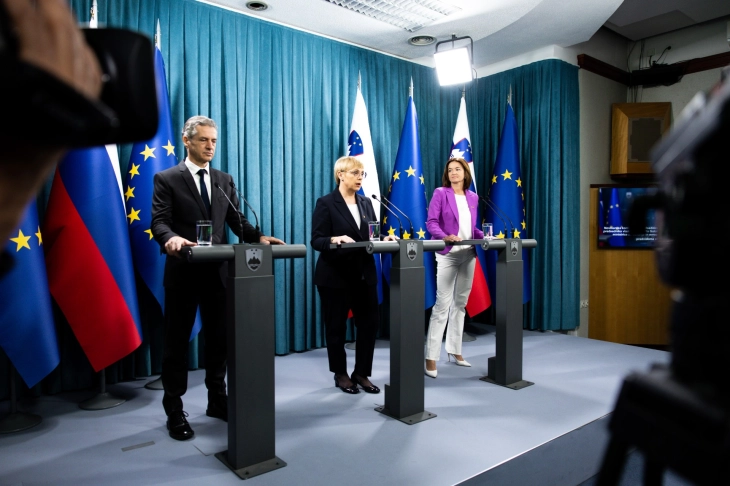
Skopje, 21 June 2023 (MIA) - Slovenia's President Nataša Pirc Musar, Prime Minister Robert Golob, and the Minister of Foreign and European Affairs Tanja Fajon, point out in a joint statement on the 20th anniversary of the EU-Western Balkans Summit in Thessalonik that "the Summit conclusions remain an abiding commitment for us all – the EU with its member states, including Slovenia, and the Western Balkans".
"Today, 21 June, is the 20th anniversary of the EU-Western Balkans Summit in Thessaloniki, Greece. At this historic event, the European Union and the acceding and potential candidate countries from the Western Balkans at that time committed themselves to each other. The EU pledged to the European perspective of the Western Balkans, while the countries in the region endorsed the shared values of democracy, the rule of law, respect for human and minority rights, solidarity and a market economy. The Summit conclusions remain an abiding commitment for us all – the EU with its member states, including Slovenia, and the Western Balkans," reads the joint statement.
Slovenia, it adds, highly values the Summit, as it gave new hope for the stabilisation of the region after years of wars, political instability and economic stagnation following the dissolution of Yugoslavia, and it gave life to a dream of a European future that would lead to positive changes: increased prosperity, improved connectivity and enhanced people-to-people contacts.
"In the last twenty years, much has been achieved through cooperation. The Western Balkans has seen a general stability. The countries of the region today enjoy the benefits of a visa-free regime, and the region has recorded steady economic progress since then. The EU is by far the biggest donor and investor in the region, as it naturally gravitates towards the Western Balkans, and vice versa," the joint statement notes.
Slovenia has been a firm supporter of enlargement within the European Union, it reads, and has assisted its Western Balkans partners by lending political backing and by supporting enlargement-related processes in the region.
"We have assisted in every way possible. This has been our long-term policy that will not change. It is no secret, however, that many opportunities have been missed on both sides. It appears that the initial enthusiasm for reform in the Western Balkans has partly evaporated over the two decades and that, as a result, the light at the end of the tunnel indicating EU membership appears to be farther away than we had hoped it would be at this point. However, the EU has been dealing with its own challenges, and the enlargement has not always been a priority. The European Union is now forced to deal with the consequences of the war in Ukraine, which has made us re-think our approach to the EU enlargement process in general. We believe it is clear that the enlargement process is fundamentally a strategic choice, not only a technical exercise. Nevertheless, further enlargement must follow the fundamental vision of the European integration process, which is based on solidarity and the actual progress of candidate countries," says the statement.
Pirc Musar, Golob and Fajon stress that courageous political decisions are needed.
"Our messages to the region, to Europe and the world are clear. Firstly, the EU is objectively a very good choice for the region, but it is up to the Western Balkans countries to decide on their future. Secondly, Slovenia has no selfish interests in the region. Our policy is driven by solidarity with the countries and people of the Western Balkans. Slovenia wants what the people want: stability and security as a prerequisite for prosperity and economic progress," the three point out in the joint statement.
Pirc Musar, Golob and Fajon underline that the Western Balkan countries aspiring to join the EU can count on Slovenia, now and in the future.

